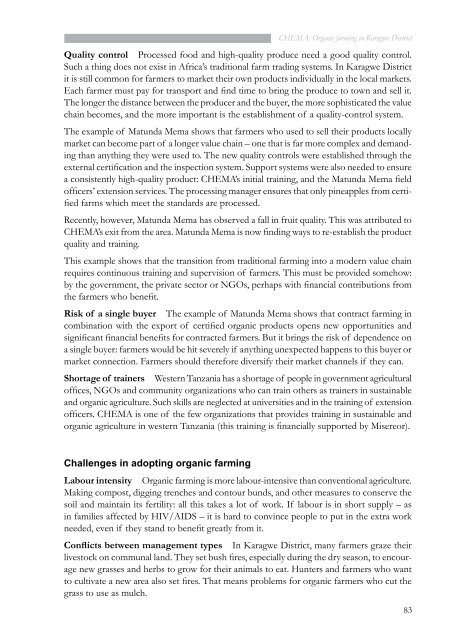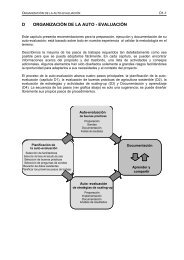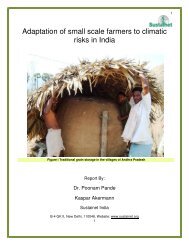cases from tanzania - Sustainet
cases from tanzania - Sustainet
cases from tanzania - Sustainet
You also want an ePaper? Increase the reach of your titles
YUMPU automatically turns print PDFs into web optimized ePapers that Google loves.
CHEMA: Organic farming in Karagwe District<br />
Quality control Processed food and high-quality produce need a good quality control.<br />
Such a thing does not exist in Africa’s traditional farm trading systems. In Karagwe District<br />
it is still common for farmers to market their own products individually in the local markets.<br />
Each farmer must pay for transport and find time to bring the produce to town and sell it.<br />
The longer the distance between the producer and the buyer, the more sophisticated the value<br />
chain becomes, and the more important is the establishment of a quality-control system.<br />
The example of Matunda Mema shows that farmers who used to sell their products locally<br />
market can become part of a longer value chain – one that is far more complex and demanding<br />
than anything they were used to. The new quality controls were established through the<br />
external certification and the inspection system. Support systems were also needed to ensure<br />
a consistently high-quality product: CHEMA’s initial training, and the Matunda Mema field<br />
officers’ extension services. The processing manager ensures that only pineapples <strong>from</strong> certified<br />
farms which meet the standards are processed.<br />
Recently, however, Matunda Mema has observed a fall in fruit quality. This was attributed to<br />
CHEMA’s exit <strong>from</strong> the area. Matunda Mema is now finding ways to re-establish the product<br />
quality and training.<br />
This example shows that the transition <strong>from</strong> traditional farming into a modern value chain<br />
requires continuous training and supervision of farmers. This must be provided somehow:<br />
by the government, the private sector or NGOs, perhaps with financial contributions <strong>from</strong><br />
the farmers who benefit.<br />
Risk of a single buyer The example of Matunda Mema shows that contract farming in<br />
combination with the export of certified organic products opens new opportunities and<br />
significant financial benefits for contracted farmers. But it brings the risk of dependence on<br />
a single buyer: farmers would be hit severely if anything unexpected happens to this buyer or<br />
market connection. Farmers should therefore diversify their market channels if they can.<br />
Shortage of trainers Western Tanzania has a shortage of people in government agricultural<br />
offices, NGOs and community organizations who can train others as trainers in sustainable<br />
and organic agriculture. Such skills are neglected at universities and in the training of extension<br />
officers. CHEMA is one of the few organizations that provides training in sustainable and<br />
organic agriculture in western Tanzania (this training is financially supported by Misereor).<br />
challenges in adopting organic farming<br />
Labour intensity Organic farming is more labour-intensive than conventional agriculture.<br />
Making compost, digging trenches and contour bunds, and other measures to conserve the<br />
soil and maintain its fertility: all this takes a lot of work. If labour is in short supply – as<br />
in families affected by HIV/AIDS – it is hard to convince people to put in the extra work<br />
needed, even if they stand to benefit greatly <strong>from</strong> it.<br />
Conflicts between management types In Karagwe District, many farmers graze their<br />
livestock on communal land. They set bush fires, especially during the dry season, to encourage<br />
new grasses and herbs to grow for their animals to eat. Hunters and farmers who want<br />
to cultivate a new area also set fires. That means problems for organic farmers who cut the<br />
grass to use as mulch.<br />
83




